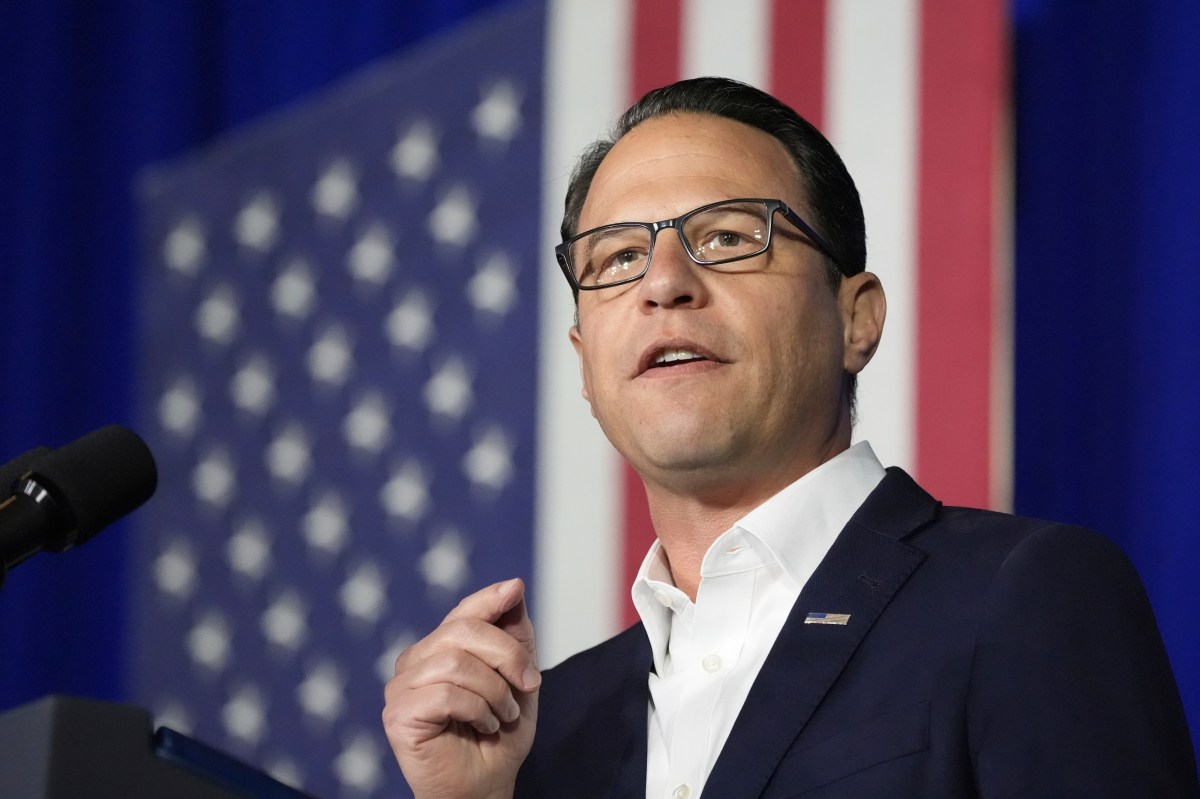Ben Shapiro Pennsylvania - A Look At His Influence
When you hear the name Ben Shapiro, a lot of different ideas might come to mind, especially if you follow political conversations. He is, you know, a fairly well-known person who shares his thoughts on many topics. For folks interested in what's happening in places like Pennsylvania, it's worth taking a moment to consider how someone like Shapiro fits into the broader picture, or how his work might touch upon the happenings there.
You see, his voice carries across various platforms, reaching a lot of people who are keen to hear conservative viewpoints. Whether it's through his regular written pieces or his audio shows, he puts out a steady stream of opinions that, in some respects, contribute to the national talk. This often includes discussions that, quite naturally, relate to individual states and their particular situations, like those found in Pennsylvania.
So, this piece will take a little look at Ben Shapiro himself, exploring his background and what he does. We'll also see how his work might, in a way, connect with or be relevant to the state of Pennsylvania, touching on everything from political discussions to, perhaps, the business environment, and even some of the broader issues he talks about that have a general reach. It's about getting a sense of the person and how his public presence might, you know, interact with a specific place like Pennsylvania.
Table of Contents
- Ben Shapiro - A Public Figure's Story
- How Does Shapiro Connect with Pennsylvania?
- What Are Some of Shapiro's Legal Connections?
- Shapiro's Views on Public Discourse - What's the Take on Shapiro Pennsylvania?
- Other Mentions of Shapiro and Pennsylvania
Ben Shapiro - A Public Figure's Story
Ben Shapiro, whose full name is Benjamin Aaron Shapiro, was born on January 15, 1984. He is a person from America who is well-known for sharing his thoughts on politics from a conservative point of view. He also spends time as a host for various media programs and has a background as a lawyer. You know, he puts his ideas out there in many ways, reaching a lot of people who follow political talk and public happenings. He has, in a way, built a career around discussing current events and the ideas that shape our society, which, you know, makes him a fairly significant voice in these conversations.
He regularly writes articles that appear in different publications. For instance, he contributes columns for Creators Syndicate, which helps distribute his writings widely. He also puts his thoughts into print for Newsweek, a publication many people read for news and opinions. And, in addition, his writings show up in Ami, too. This means his ideas get to a broad audience through these various outlets, giving him a consistent way to share his views on, say, what's going on in the world or how things should be.
People often describe Ben Shapiro as a very recognized conservative political pundit. He is also a columnist whose articles are shared widely, meaning many newspapers and websites carry his work. Beyond that, he is a trained lawyer, and he has also written books that have made it onto the New York Times bestseller list. He used to hold a significant role at a news and opinion website called The Daily Wire, where he was editor emeritus. This means he had a very important position there, helping shape the content and direction of the site, which, you know, is quite a big deal in the online media space.
What is Ben Shapiro's background?
Ben Shapiro has, in a way, a varied set of skills and experiences that contribute to his public persona. His work as a political commentator means he spends a lot of time analyzing and talking about political happenings, offering his particular viewpoint. As a media host, he leads discussions and interviews, giving a platform to different ideas and, you know, guiding conversations for his audience. His legal training as an attorney means he approaches topics with a certain analytical rigor, often looking at arguments from a structured, legal point of view. This combination of roles makes him a rather unique figure in public discussions.
He is known, too, for being a prolific writer. His regular columns for places like Creators Syndicate, Newsweek, and Ami ensure that his thoughts are consistently available to a wide readership. These columns, in a way, serve as a steady stream of his perspectives on current events, policy, and cultural matters. The fact that he's a syndicated columnist means his work is picked up by many different news sources, extending his reach far beyond just one publication. This really helps to spread his ideas and, you know, keeps him a part of the daily conversation for many people who follow the news.
As a lawyer, he has a solid foundation in how laws work and how to argue a case. This background, you know, likely informs his approach to political commentary, where he often breaks down issues with a logical, almost legal, precision. The mention of him being a New York Times bestselling author also points to his ability to communicate complex ideas in a way that resonates with a large number of readers, which, actually, is quite a feat for any writer. And his role as editor emeritus at The Daily Wire shows his influence in building and shaping a significant media platform, basically helping to create a space for conservative voices online.
| Detail | Information |
|---|---|
| Full Name | Benjamin Aaron Shapiro |
| Date of Birth | January 15, 1984 |
| Profession | Political Commentator, Media Host, Attorney |
| Column Contributions | Creators Syndicate, Newsweek, Ami |
| Notable Role | Editor Emeritus of The Daily Wire |
| Author Status | New York Times Bestselling Author |
| Legal Background | Trained Trial Lawyer |
How Does Shapiro Connect with Pennsylvania?
While Ben Shapiro is a national figure, his ideas and discussions often touch on specific state-level happenings, which, you know, can include what's going on in Pennsylvania. His commentary, in a way, provides a lens through which many people view political developments across the country, including those that might have a particular impact on a state like Pennsylvania. So, even if he's not directly involved in Pennsylvania politics every day, his general viewpoints and analyses can certainly influence how his audience perceives events and policy choices within the state. This connection is more about the broad reach of his commentary and how it applies to various local situations.
His discussions on topics like economic policy, regulation, or government efficiency, for example, have direct relevance to how a state like Pennsylvania manages its affairs. When he talks about ways to make places more attractive for businesses, those ideas can be applied to efforts within Pennsylvania to foster economic growth. It's a bit like providing a general framework that states can then use to think about their own unique challenges and opportunities. So, his influence on Pennsylvania, in this sense, comes from the general principles and ideas he promotes, which, really, can shape public opinion and discussion in any part of the country, including Pennsylvania.
Shapiro and Pennsylvania's Business Scene
It's interesting to note that the discussion around making states more competitive for business is something that has been associated with Shapiro's broader commentary, and this, you know, can certainly apply to Pennsylvania. There's been talk, for instance, about steps taken to make Pennsylvania a more welcoming place for businesses. This includes efforts to cut down on how long people have to wait for permits and various state services, which, actually, can be a big help for companies trying to get things done. Also, there's been work to speed up the process of reducing certain things, which, you know, makes it easier for businesses to operate and perhaps even grow within the state.
These kinds of actions are usually aimed at creating a friendlier environment for commerce and investment within Pennsylvania. When the state government works to streamline processes, it means less hassle for businesses, which, in turn, can encourage them to set up shop or expand existing operations there. This focus on efficiency and reducing obstacles is a theme that often comes up in broader discussions about economic health, and it's a point that, say, a commentator like Shapiro might often bring up in his general analysis of how states can improve their economic standing. So, while not a direct action by him, the ideas he promotes align with such efforts in Pennsylvania.
Shapiro and Political Talk in Pennsylvania
When it comes to the political landscape in Pennsylvania, there are always a lot of discussions and, you know, various viewpoints being shared. Ben Shapiro, as a political commentator, frequently offers his thoughts on election cycles and the choices facing voters. For instance, there's been talk about the upcoming election for governor in Pennsylvania. It seems that for those who support the Republican side, a key point has been to find a good candidate to challenge the current Democratic governor in next year's bid for reelection. This is, you know, a fairly typical part of the political process in any state, and Pennsylvania is no different.
The conversation around who might run for office, or who could be a strong contender, is a big part of political commentary, and Ben Shapiro often weighs in on these kinds of strategic considerations. He might, for example, discuss what qualities a candidate needs to appeal to voters in a state like Pennsylvania, or what issues might be most important to the people living there. So, his commentary, in a way, provides analysis on the broader political strategies that parties might use, which, you know, certainly applies to the specific political happenings in Pennsylvania as they unfold.
It's also worth noting that discussions about potential running mates for national figures, like, say, Kamala Harris, can sometimes involve state governors. There's been some talk, for example, that Pennsylvania's current governor is someone who has been considered as a possible running mate. When this kind of speculation comes up, people naturally want to learn more about that person's history and what their policies are all about. This kind of political chatter, too, becomes part of the wider conversation that figures like Ben Shapiro might analyze or comment on, especially when it involves a state as important as Pennsylvania in the national political scene.
What Are Some of Shapiro's Legal Connections?
Ben Shapiro has a strong background as a trial lawyer, which means he has experience going to court and presenting cases. He has, you know, a rather extensive history of successfully representing people who were involved in various kinds of lawsuits. These cases were heard in both New York state courts and federal courts, which suggests a wide range of legal work. His ability to win cases for his clients in these different settings shows that he has a good grasp of legal procedures and how to argue effectively in a courtroom setting. This practical experience in the legal world gives him a distinct perspective that he often brings to his public commentary, too.
This experience as a practicing attorney means he's seen how the legal system works up close. He understands the ins and outs of court proceedings, from preparing arguments to presenting them before a judge or jury. This kind of hands-on legal work, in a way, provides a solid foundation for his analytical approach to many issues, whether they are political or social. It's fair to say that his training as a lawyer has, you know, shaped his way of thinking, making him someone who often looks for logical arguments and evidence, which, really, is a core part of what lawyers do.
Shapiro's Views on Public Discourse - What's the Take on Shapiro Pennsylvania?
Ben Shapiro often speaks about various aspects of public conversation and, you know, the way people express their views, especially in heated situations. He has, for example, made a point of distinguishing between different kinds of people who take part in protests. He also, in a way, issued warnings against prejudice towards Muslims on college campuses. However, there was one particular statement he made that caused a lot of discussion and, at times, was taken out of its original context, which, actually, led to some strong reactions. This often happens in public discourse, where a single line can be separated from the rest of what was said and then interpreted in many different ways.
His commentary on such topics is part of his broader effort to discuss how ideas are exchanged in public spaces, particularly in today's rather charged environment. He tries to, you know, encourage a more thoughtful approach to difficult conversations, even when his own words are sometimes the subject of debate. The idea of context being stripped from a statement is a common challenge in public commentary, especially when things are shared quickly on social platforms. So, his own experiences with this highlight the challenges of communicating complex ideas to a wide audience, which, you know, is something many public figures face.
He continues to put his thoughts down in regular articles for various publications. For instance, he writes columns for Creators Syndicate, ensuring his perspectives are widely available. This ongoing writing work is a consistent way for him to contribute to public discourse, sharing his viewpoints on a range of issues that affect people across the country, including those in Pennsylvania. His continued output, in a way, means he remains an active voice in the national conversation, offering his analysis on everything from political events to cultural shifts, which, you know, keeps him relevant to many who follow his work.
It's also worth mentioning again that he has put out more than 30 pieces of work. This suggests a fairly consistent output of content, whether it's books, articles, or other forms of media. This level of production means he is constantly contributing to the public discussion, giving his audience new material to consider. His efforts to, you know, put out a lot of content means he is always providing fresh perspectives for people who follow his work, which, really, helps him maintain his presence in the ongoing national conversation about politics and culture.
Other Mentions of Shapiro and Pennsylvania
Beyond his direct commentary, Ben Shapiro's name also appears in some academic discussions. For instance, there's a mention of "Shapiro, a logic of arbitrary and indefinite objects." This suggests his name is connected to scholarly work that looks into how we think about things and the rules that govern our thoughts. And then, in a way, you find references to "Williams, principles of knowledge representation and reasoning," and even "Proceedings of the ninth international" which seem to go along with these ideas. It just shows his name is around in places that talk about how ideas work and how we figure things out, which, you know, is a different side to his public profile.
These academic connections, while not directly related to his public commentary, suggest a broader intellectual engagement. It's a bit like seeing a different facet of his influence, where his name might be cited or discussed in contexts that are more theoretical or philosophical. This simply means his work or ideas have, in some respects, made their way into scholarly conversations, which, actually, is quite a common occurrence for public figures whose work touches on complex subjects. So, it adds another layer to understanding the various ways his name appears in different areas of discussion, including those that are quite academic in nature.

Pennsylvania governor: Josh Shapiro beats Doug Mastriano

Pennsylvania to begin new fiscal year without budget, as Shapiro

Meet Josh - Shapiro For Governor